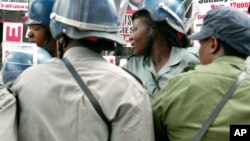The United States has expressed deep concern over the police search of the Zimbabwe Counseling Services Unit (CSU) Medical Clinic and the arrest of three senior program officers.
In a statement, the U.S. Embassy in Harare said the CSU is a lawfully registered medical clinic providing non-partisan counseling and referral services to victims of trauma.
The U.S. said the search represents the latest incident in a worrying trend of deploying elements of the state security sector institutions to threaten and intimidate political activists and those who provide support to victims of such intimidation and abuse.
‘In the lead up to national elections, the U.S. looked to the government of Zimbabwe to ensure that all security sector leaders and groups strictly follow President Mugabe’s call for non-violence and that they also follow a policy of non-interference in democratic processes, including no harassment, intimidation, or hints of retribution," it said.
Meanwhile, Human Rights Watch shared similar sentiments saying the police action is raising fears of a broader crackdown on activists perceived as opposing the government ahead of elections, which would directly affect Zimbabweans living in the diaspora.
These concerns come just as Prime Minister Morgan Tsvangirai begun a trip to court the diaspora vote in South Africa, U.S, United Kingdom and elsewhere in order to lure Zimbabweans to return home and vote in next year’s crucial polls.
As the current draft constitution does not allow for a diaspora vote, activists argue that a mass return of Zimbabweans to vote may lead to a police crackdown.
Tiseke Kasambala, senior researcher with Human Rights Watch, told VOA Studio 7 that the state election commission should provide the necessary mechanism to ensure that Zimbabweans throughout the diaspora would be able to vote.
Joy Mabenge, democracy and governance program manager with the Institute for a Democratic Alternative Zimbabwe, said the diaspora vote is an issue civil society must continue pushing for even if Zimbabweans abroad are not expected to return for a vote.
Elsewhere, the National Association of Non-Governmental Organizations (NANGO) said it is trying to meet with Police Commissioner-General Augustine Chihuri to complain about the continued harassment of its members.
NANGO executive director Cephas Zinhumwe said they tried to meet with Chihuri on Thursday but were told he was too busy to do so and promised to invite them whenever he will be free.
Zinhumwe said they hope the police commissioner general will honor his promise and meet with them soon before things get worse.
In a statement, the U.S. Embassy in Harare said the CSU is a lawfully registered medical clinic providing non-partisan counseling and referral services to victims of trauma.
The U.S. said the search represents the latest incident in a worrying trend of deploying elements of the state security sector institutions to threaten and intimidate political activists and those who provide support to victims of such intimidation and abuse.
‘In the lead up to national elections, the U.S. looked to the government of Zimbabwe to ensure that all security sector leaders and groups strictly follow President Mugabe’s call for non-violence and that they also follow a policy of non-interference in democratic processes, including no harassment, intimidation, or hints of retribution," it said.
Meanwhile, Human Rights Watch shared similar sentiments saying the police action is raising fears of a broader crackdown on activists perceived as opposing the government ahead of elections, which would directly affect Zimbabweans living in the diaspora.
These concerns come just as Prime Minister Morgan Tsvangirai begun a trip to court the diaspora vote in South Africa, U.S, United Kingdom and elsewhere in order to lure Zimbabweans to return home and vote in next year’s crucial polls.
As the current draft constitution does not allow for a diaspora vote, activists argue that a mass return of Zimbabweans to vote may lead to a police crackdown.
Tiseke Kasambala, senior researcher with Human Rights Watch, told VOA Studio 7 that the state election commission should provide the necessary mechanism to ensure that Zimbabweans throughout the diaspora would be able to vote.
Joy Mabenge, democracy and governance program manager with the Institute for a Democratic Alternative Zimbabwe, said the diaspora vote is an issue civil society must continue pushing for even if Zimbabweans abroad are not expected to return for a vote.
Elsewhere, the National Association of Non-Governmental Organizations (NANGO) said it is trying to meet with Police Commissioner-General Augustine Chihuri to complain about the continued harassment of its members.
NANGO executive director Cephas Zinhumwe said they tried to meet with Chihuri on Thursday but were told he was too busy to do so and promised to invite them whenever he will be free.
Zinhumwe said they hope the police commissioner general will honor his promise and meet with them soon before things get worse.








